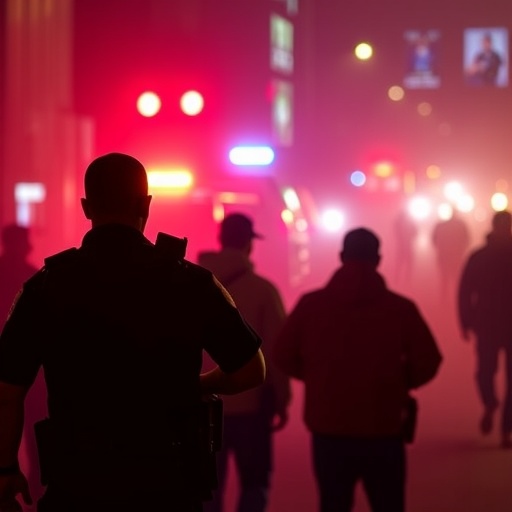The COVID-19 pandemic has unleashed unprecedented challenges worldwide, particularly for essential workers such as law enforcement officers. A new research study titled “Determinants of COVID-19 mortality among the US law enforcement officers” has shed light on this critical issue, revealing significant insights into the factors that heighten the risk of mortality among this essential workforce. The study serves not only as a statistical analysis but also as a wake-up call for public health systems and law enforcement agencies.
As the world grappled with the chaos triggered by the pandemic, law enforcement officers found themselves on the front lines, exposed to heightened risk due to their interactions with the public. The study conducted by Okunade, Olarewaju, and Oyemakinde rigorously examined the variables that contribute to an increased risk of mortality from COVID-19 among police officers. This demographic’s well-being is crucial, as they play a pivotal role in maintaining public order and safety.
A comprehensive examination of various determinants has been presented in the study, ranging from pre-existing health conditions to demographic factors. The researchers focused on the correlation between age, underlying medical issues, and the mortality rate associated with COVID-19 among law enforcement personnel. They discovered that older officers were disproportionately affected, emphasizing an urgent need for agencies to address age-related vulnerabilities.
Equally critical was the examination of pre-existing health conditions that could exacerbate the effects of COVID-19. Officers with comorbidities such as hypertension, diabetes, and cardiovascular diseases faced drastically heightened risks. This underscores the importance of ongoing health monitoring and intervention programs for law enforcement personnel, who may often neglect their health in the pursuit of their demanding jobs.
Beyond health conditions, demographic factors proved to play a substantial role in determining COVID-19 mortality rates. Racial and ethnic disparities surfaced as significant findings in this research. Law enforcement officers from minority backgrounds experienced higher mortality rates compared to their white counterparts, which raises important questions about equity and access to health resources.
In addition to demographic and health-related factors, the researchers explored occupational hazards that could increase exposure to the virus. Officers often work in settings where social distancing can be challenging or impossible. The nature of police work inherently involves contact with individuals from various backgrounds, elevating the likelihood of virus transmission. Consequently, the study emphasizes the urgent need for law enforcement agencies to implement further safety measures and training regarding COVID-19 protocols.
The impact of stress and mental health on COVID-19 mortality has also come to the forefront in this research. The psychological toll of being on the front lines amid a global health crisis is immense. Officers face immense pressures, which can lead to detrimental physical health outcomes. Thus, it becomes vital for agencies to integrate mental health support services into their organizational frameworks.
Interestingly, the researchers also noted the role of community relationships and public interactions in influencing COVID-19 outcomes among officers. A strong rapport with the community can facilitate better public compliance with health regulations, ultimately reducing the risk of virus transmission during interactions. This perspective emphasizes that law enforcement is not just a protective service but also a community partner in public health.
As the study highlights these pressing issues, there emerges a need for policy changes at multiple levels. Law enforcement agencies are urged to collaborate with public health officials to develop and implement comprehensive health strategies tailored for officers. Such interventions can mitigate the impact of future pandemics on this critical workforce and ensure their well-being.
This study is a critical reminder of the interplay between public health and occupational safety, especially in high-risk professions like law enforcement. It invites stakeholders to pay closer attention to the unique needs and vulnerabilities of these essential workers. By doing so, we can more effectively safeguard the health of law enforcement officers and, in turn, the health of the communities they protect.
As the pandemic evolves, continued research is vital in identifying effective strategies for protecting law enforcement personnel. The study underscores the significance of not just understanding the data but proactively addressing the ramifications that COVID-19 has had on this brave workforce. The findings call for an immediate action plan aimed at enhancing the health and safety of officers while they serve on the front lines.
Ultimately, “Determinants of COVID-19 mortality among the US law enforcement officers” stands as a seminal piece of research that urges a multifaceted approach to protect the officers risking their lives daily. The knowledge garnered from this study should serve as a clarion call for public health interventions that simultaneously support the physical and mental well-being of law enforcement personnel. It is through this lens that we can foster a safer, healthier future for both officers and the communities they serve.
In conclusion, the insights drawn from the study serve not just as a statistical analysis but as a resounding clarion call for urgent action to ensure the welfare of our law enforcement officers in light of ongoing public health challenges. The future will inevitably include a series of hurdles, and prioritizing the health of those who keep our streets safe must remain at the forefront of our societal values and responsibilities.
Subject of Research: COVID-19 mortality among US law enforcement officers
Article Title: Determinants of COVID-19 mortality among the US law enforcement officers
Article References:
Okunade, A., Olarewaju, F., Oyemakinde, B. et al. Determinants of COVID-19 mortality among the US law enforcement officers.
J Pop Research 42, 41 (2025). https://doi.org/10.1007/s12546-025-09393-y
Image Credits: AI Generated
DOI: 10.1007/s12546-025-09393-y
Keywords: COVID-19, law enforcement officers, mortality, public health, risk factors




